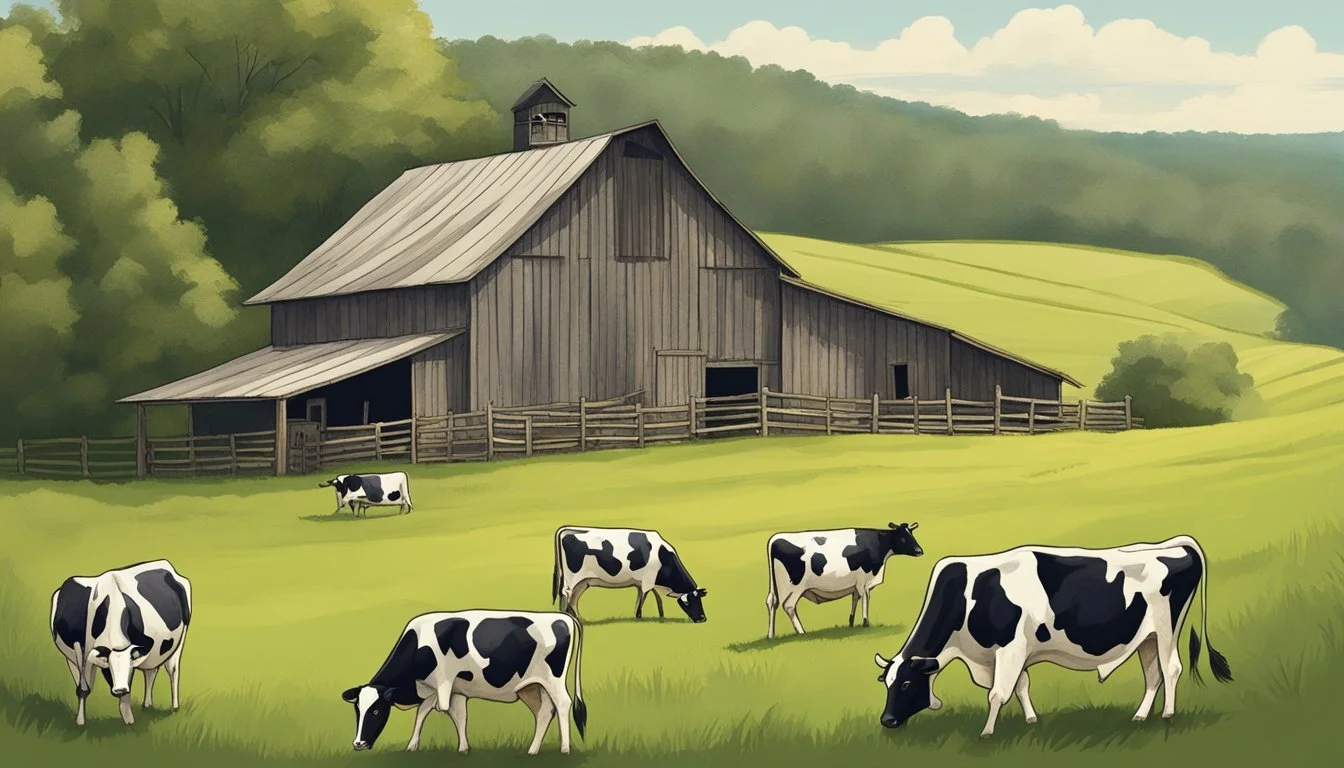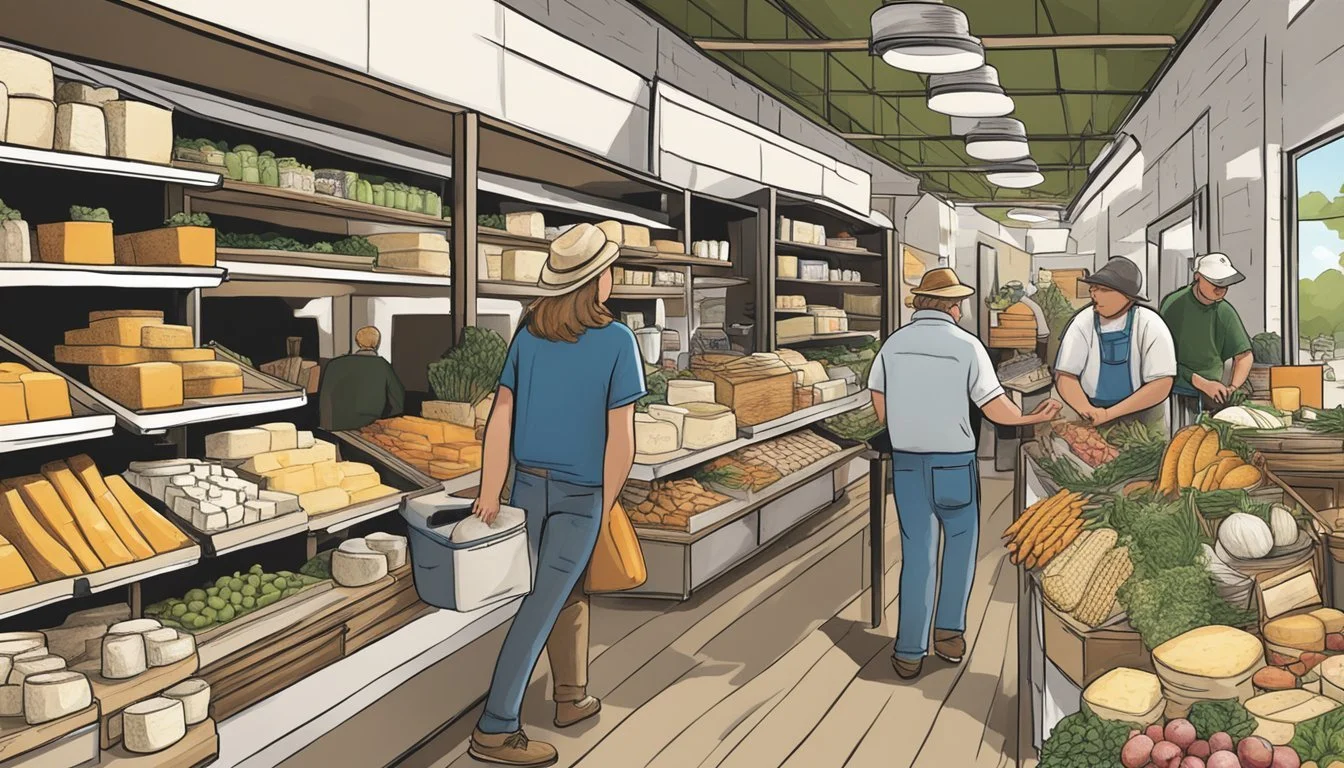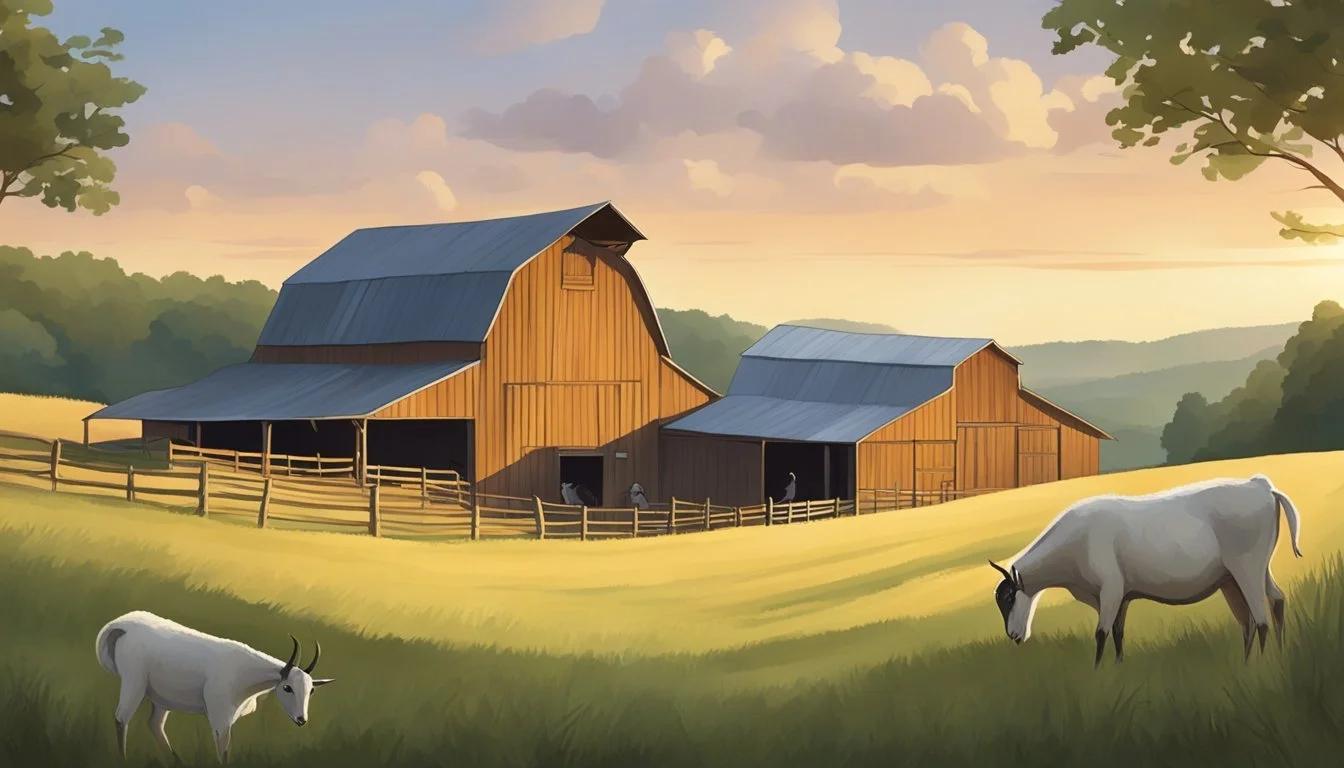Alabama Artisan Cheese
A Guide to the State's Finest Cheeses
In the rich tapestry of Southern culinary traditions, Alabama emerges with a distinctive offering: artisanal cheese (how long does cheese last?). Renowned for its diverse agriculture, the state has seen a resurgence in cheese-making, paying homage to time-honored methods while infusing local flavors and innovation. This revival speaks to a broader trend of appreciating hand-crafted, small-batch foods where quality and attention to detail reign supreme.
Cheese (What wine goes well with cheese?) artisans in Alabama, a state less commonly known for dairy production compared to its vast cotton fields, are carving out a niche with their unique products. From the creamy tang of goat cheese at creameries like Belle Chevre in Elkmont to the rich flavors of organic cow's milk cheese from farms such as Working Cows Dairy in Slocomb, Alabama offers a variety of cheese experiences. The state's cheesemakers not only embrace traditional techniques but also adopt sustainable practices that reflect a commitment to their craft and the environment.
Each Alabama creamery contributes to the state's burgeoning reputation for fine cheeses, with several establishments gaining national attention. Visitors and locals alike are drawn to the pastoral charm of these dairy farms and creameries, which often come paired with on-site tasting rooms and shops that feature an array of artisanal cheeses alongside other locally made products. These venues showcase the state's culinary creativity and offer a gastronomic journey that's rooted in Alabama's local resources and artisanal heritage.
History of Alabama Artisan Cheese
The rise of Alabama's artisan cheese is a testament to the state's deepening agricultural roots and innovative spirit within the dairy farming industry.
Foundations of Dairy Farming in Alabama
Alabama's climate and geography have proven conducive for dairy farming, with milk production being central to agricultural pursuits in the state. Dairy farming in Alabama traditionally focused on producing milk for local consumption, with an emphasis on cattle that thrived in the Southern environment.
Origins of Artisan Cheese Making
Artisan cheese making in Alabama is a relatively recent development, taking shape as part of a broader resurgence of artisanal food production methods. Sweet Home Farm in Elberta emerged as the first licensed farmstead cheesemaker in Alabama, signifying a pivotal moment in the state's dairy farming history. The movement has been characterized by a dedication to quality, craftsmanship, and the use of local milks, including those from cows, goats, and sheep, to produce a diverse range of cheeses.
Types of Alabama Artisan Cheese
Alabama artisan cheese captures the robust flavors and traditions of the region, offering a diverse range of products. Cheesemakers in Alabama have honed their craft, producing fine cheeses that are both rooted in tradition and innovatively modern.
Montrachet-Style Cheese Logs
Montrachet-Style Cheese Logs are a staple among Alabama's artisan goat cheeses (What wine goes well with goat cheeses?). These logs are known for their rich, tangy flavor and dense, creamy texture, making them a beloved choice for both cheese platters and cooking applications. Their versatility and fine quality often make them a choice ingredient for local chefs and gourmets.
Greek Kiss and Brined Grape Leaves
Under the unique category of Alabama’s artisan cheese offerings, Greek Kiss is a standout. This particular cheese envelops a brined grape leaf around a delicate core of goat cheese, presenting a fusion of traditional Greek and Southern culinary artistry. The brined grape leaves not only impart a subtle, vinegary note but also add a visually stunning element to the cheese.
Farmstead Cheese Varieties
Lastly, the state takes pride in its Farmstead Cheese Varieties. Farmstead denotes that the cheeses are made on the same farm where the animals are raised, ensuring maximum freshness and traceability. Cheesemakers utilize milk from cows, goats, and sheep to create an array of flavors, textures, and styles, ranging from soft, spreadable cheeses to aged, hard cheeses. Each variety reflects the local pasture and care given to the livestock, bolstering Alabama’s position in the artisanal cheese movement.
Leading Artisan Cheesemakers
Alabama's landscape is not just fertile ground for agriculture, it's also a nurturing environment for artisanal cheesemaking. Esteemed creameries such as Belle Chevre, Dayspring Dairy, and Working Cows Dairy have carved a niche, creating unique and award-winning cheeses that reflect the rich culinary heritage of the state.
Belle Chevre Creamery Profile
Located in the quaint town of Elkmont, Belle Chevre has been producing handcrafted goat cheeses for over three decades, accumulating more than 100 national awards. Their cheeses, like the acclaimed Feta and creamy Ricotta, are the work of skilled artisans who blend traditional techniques with innovative flair. The creamery offers a variety of products, from fresh spreads to aged delights, and has become a notable destination for cheese enthusiasts.
Address: 18845 Upper Fort Hampton Rd., Elkmont, AL 35620
Phone: 256-732-4801
Products:
Feta
Ricotta
Chevre spreads
Dayspring Dairy's Halloumi and Feta
Dayspring Dairy, Alabama's first sheep dairy and artisanal cheesemakers, stand out for their distinctive Halloumi and Feta cheeses. Greg and Ana Kelly, the husband-and-wife team at the helm, prioritize natural and ethical farming methods to produce their flavorful cheeses. The rich, tangy taste of Dayspring Dairy's feta and the firm, grilling-friendly texture of their halloumi have garnered a dedicated following at farmers markets across the state.
Owners: Greg and Ana Kelly
Specialties:
Sheep milk Halloumi
Sheep milk Feta
Working Cows Dairy and Their Cheeses
Working Cows Dairy presents an array of organic cheeses, produced sustainably on their family-run farm. They are committed to ethical cheesemaking practices, ensuring their cows are not only pasture-fed but also treated with care. Among their offerings, the robust flavors of their cheddar and the delicate nuances of their soft cheeses (What wine goes well with soft cheeses?) reflect their mastery of the craft. Consumers can find their products at local grocery stores, indicative of their reach and popularity in Alabama and beyond.
Cheese Varieties:
Organic Cheddar
Soft cheeses
The profiles of these acclaimed Alabama cheesemakers are testament to the state's burgeoning reputation in the world of artisanal cheese. Each offers a slice of regional taste, encapsulating the spirit and tradition of Southern cheesemaking.
Production Techniques and Facilities
Artisanal cheesemaking in Alabama combines traditional skills with local flavors to create both award-winning and ultra-local dairy products. Key to these processes are the production facilities and techniques.
Small-Batch Production Methods
Small-scale cheesemakers in Alabama emphasize hands-on techniques in their production facilities. They prioritize quality and creativity, which results in a variety of cheeses made from cow, sheep, and goat milks. Since these producers often operate with fewer than two dozen farms, the focus is on meticulous attention to detail at each step of the cheesemaking process, from milk selection to aging. This approach has led to Alabama's artisan cheeses winning recognition, notably a gold medal in the World Cheese Awards for a locally created cheese named CHEVOO.
Key Elements in Small-Batch Cheesemaking Facilities:
Selective Sourcing: Utilizing high-quality, local milk.
Equipment: Specially tailored for small-scale production.
Aging Rooms: Climate-controlled environments to age cheeses properly.
Mass-Production Versus Ultra-Local Product
The contrast between mass-produced cheese and the ultra-local products of Alabama's cheesemakers is stark. Mass-produced cheeses benefit from economies of scale, using large, automated production facilities that can churn out vast quantities of cheese. However, they often lack the distinct regional character of Alabama's artisanal cheeses.
In Alabama, the ultra-local product takes precedence. This means the facilities are typically smaller, more specialized, and embedded within the community. These producers often utilize traditional methods, and their proximity to their consumer base allows for fresh, locally-sourced ingredients to be a prominent feature of their cheeses.
Facility Comparison:
Aspect Small-Batch Facility Mass-Production Facility Production Volume Low High Technique Handcrafted Automated Product Variety Diverse, unique flavors Standardized Local Ingredients Highly utilized Less emphasized Community Engagement Direct Indirect
Alabama's artisan cheesemakers have successfully positioned their products to appeal to those seeking quality and a unique taste experience that reflects the local terroir, distinguishing them from mass-produced counterparts.
Pairings and Usage
Artisan cheese from Alabama offers a tapestry of flavors and textures that make it a versatile ingredient in the kitchen. Whether featured on a charcuterie board or contributing to the complexity of a cooked dish, these cheeses provide delightful taste experiences and opportunities for culinary creativity.
Cheese in Charcuterie Boards
When building a charcuterie (What wine goes well with charcuterie?) board, the selection of artisan cheeses is crucial for offering a range of sensory experiences. For a well-balanced board, one should include a variety of textures and flavors.
Soft Cheeses: Such as a young chèvre, pair beautifully with light fruits like apples and melons.
Hard Cheeses: Aged Gouda or cheddar, offer a delightful contrast with nuts and can complement the savory facets of cured meats (What wine goes well with cured meats?).
Accompaniments: To elevate the ensemble, include a selection of chutneys, mustards, and honey, which enhance the natural qualities of the cheese.
Cooking with Artisan Cheese: Melting and Substituting
Alabama artisan cheeses shine in cooking, especially when melted or used as substitutes for more common cheeses. These are some guidelines to enhance culinary endeavors:
Melting: Semi-soft artisan cheeses like Gouda melt smoothly and can be a delicious choice for toppings on burgers or in grilled cheese sandwiches.
Substituting: When a recipe calls for a generic cheese like mozzarella, substituting it with a local artisan cheese can considerably boost the flavor profile of the dish.
Artisan cheeses from Alabama are not only rich in taste but also adaptable in their use, making them excellent candidates for both fresh and cooked applications.
Retail and Accessibility
In Alabama, cheese enthusiasts can enjoy a rich selection of artisan cheeses, thanks to the state's dedicated cheese makers. Retail avenues for these local delicacies are expanding, making it simpler for consumers to support Alabama's dairy artisans.
Finding Local Cheese Shops in Alabama
Alabama boasts a variety of cheese shops that cater to connoisseurs of handcrafted cheeses. Belle Chevre Cheese Shop & Tasting Room in Elkmont serves as a prime example, featuring Alabama-made goat cheese alongside a café menu and interactive experiences such as cheesemaking classes. Local markets and farm shops similarly provide a platform for small-scale producers to reach cheese aficionados.
Cheese Shop Location Specialty Belle Chevre Elkmont Goat Cheese
Artisan Cheese in Retail Markets
Retail markets across Alabama have begun incorporating locally-produced artisan cheeses into their inventory. These retail spaces provide a crucial channel for small-batch cheese makers to compete alongside imported and mass-produced varieties, offering consumers a taste of Alabama-grown vegetables and cheese in one place. Retailers understand that their customers appreciate quality and creativity, which Alabama's cheeses deliver with every bite.
The combined efforts of cheese makers and retailers ensure that even though Alabama may have fewer dairy farms than in the past, the ones that remain are celebrated for their delicious and innovative products.
Community and Culture
Alabama's artisan cheese industry embodies a rich blend of community-driven practices and cultural traditions. It highlights the significance of family farms and the collective joy found in celebrating local produce through various events.
Family Farms and Their Impact
Family farms are the cornerstone of Alabama’s artisan cheese community. They not only contribute to the state's cultural fabric but also bolster the local economy. For instance, the existence of farms like Belle Chevre in Elkmont indicates a resurgence in small-town allure, where the art of cheesemaking nurtures both the economy and the community's spirit. These farms often utilize the milk of local goats, contributing to the diversification and sustainability of agricultural practices, and each has a tale that intertwines with the state's historical narrative.
Sustainability: Small-scale production contributes to sustainability by focusing on quality and thoughtful use of local resources.
Education: Farms often operate as educational centers where the public can learn about cheesemaking and sustainable farming.
Cultural Heritage: The farms maintain traditional methods, preserving Alabama's pastoral heritage and introducing artisanal cheeses to new audiences.
Cheese Festivals and Events
Cheese festivals and events in Alabama serve not only as celebrations of the state's dairy prowess but also as hubs for cultural exchange and community building. At these gatherings, cheese makers and enthusiasts converge to share their passion, fostering a sense of unity and pride in Alabama's culinary scene. These events effectively showcase the variety and creativity inherent in the state's small-batch cheese production and offer a platform for local artisans to gain recognition.
Showcasing Local Talent: Festivals exhibit the craft of local cheese artisans and their unique products.
Community Engagement: Events provide an opportunity for residents and visitors to engage with local producers, enhancing community ties.
Cultural Exchange: Participants experience the diversity of the state's cheese offerings, reflecting the melting pot of cultures that influence Alabama's food traditions.
Innovations in Artisan Cheese
The artisan cheese industry in Alabama has embraced innovation, expanding its range of products to include spreadable cheese varieties and complementary items such as milk caramel and shortbread. These additions cater to the evolving tastes and preferences of consumers.
Spreadable Cheese Varieties
Spreadable Goat Cheese: Cheesemakers have developed a variety of spreadable goat cheeses, appealing to a broader audience due to their creamy texture and diverse flavor profiles. These cheeses maintain the distinct tangy quality of traditional goat cheese while offering a convenience factor that suits modern eating habits.
Texture: Smooth and easily spreadable
Flavors: Herb-infused, garlic, pepper, and sweet options like fig
Complementary Products: Milk Caramel and Shortbread
Milk Caramel Spreads: In a sweet departure from classic cheese offerings, some Alabama artisans produce milk caramel spreads. These spreads, known as 'dulce de leche' in Spanish-speaking countries, are made using a meticulous simmering process that turns milk and sugar into a rich, creamy condiment.
Uses: As a topping for desserts, a mix-in for coffees, or a sweet companion to tangy cheeses
Shortbread Cookies: Artisanal shortbread cookies, crafted with a focus on high-quality ingredients and traditional baking methods, perfectly complement the variety of cheeses. Their buttery texture and subtle sweetness balance the sharpness of the cheese, creating an indulgent pairing.
Varieties: Classic butter, almond, chocolate-dipped, and other seasonal flavors
Environmental Impact and Sustainability
Artisan cheese production in Alabama is increasingly focusing on the environmental impact and sustainability of its practices. This not only supports the regional ecosystem but also aligns with growing consumer demand for products that are produced in an environmentally conscious manner.
Grass-Fed Livestock and Organic Practices
Grass-fed livestock are a central component of sustainable artisan cheese production. By relying on natural grazing habits, cattle used for dairy production contribute to land management and encourage biodiverse pastures. Organic practices, which exclude the use of synthetic pesticides and fertilizers, further enhance the sustainability of cheese production by preserving soil health and reducing water contamination.
Reduced Carbon Footprint: Grass-fed systems potentially lower greenhouse gas emissions compared to conventional dairy farming.
Biodiversity: Organic grazing practices support diverse ecosystems, promoting soil fertility and wildlife.
Artisanal cheesemakers in Alabama also recognize the importance of these practices in maintaining the long-term viability of their agricultural lands.











